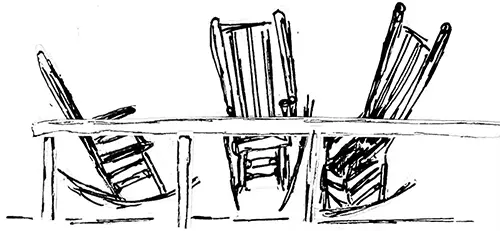Uncategorized 919
What We Lose When We Lost the Plot
He who has a piece of ground to call his own is not truly bereft, no matter what else is lost.
Books and Blessings: The Matthew Strother Center for the Examined Life
We do not need more thought leaders, but more thoughtful human beings.
The Land Ethic for AI
We have long drawn a dividing line between technology and humans, imbuing one with ethical responsibility and treating the other as merely contingent— therefore, technologies are “neutral” and it’s simply…
The Abolition of the Human
AI is a technology that eliminates process. It offers the grail without the quest.
Birmingham in June
Colby said the two men settled their dispute like men, but they looked more like buffoons than men to me.
An Agrarian Prayer
If you have ever prayed the Lord’s prayer, then you have prayed for the soil and its earthworms—even if you didn’t intend to.
Happy are Those who Know the Causes of Things: Recovering Aristotle’s Four Causes
Science can only provide partial truths because it does not consider form or end.
Bringing Up Emil
Kids are good in a theological sense, always. Sometimes, however, their behavior is not what adults would call good.
Thoreau and the Eco-Puritans of Concord
While Thoreau was by no means a Puritan, I think that similarities regarding the human occupation and the goodness of creation are evident in both.
What Do Clare Morell and Chuck Magill Have in Common?
Chuck dreams of overcoming his allergy so he can reenter normal society. We reject the status quo because we want something better for our kids.
Root For The Home Team
A team is from somewhere. Owners sell, players leave, but the place and the fans make up the fabric of the team.
An Economist’s Take on the Age of AI: A Review of Robert Skidelsky’s Mindless
Skidelsky’s expertise is on full display as he tells the story of the impact of machines on the human condition.
Despair Is Part of Life, but Not All of Life
Her heartfelt lament may sound like despair, and in a way it is, save for a crucial difference.
What We Forgot About Death (And Life)
Without the Incarnation, the philosopher’s death remains incomplete.
Compound Interest in an Attention Economy
There is something life-giving about rooting oneself in a single community—about investing ourselves in a mutual fund, so to speak.
The Quiet Divide
The rift isn’t just about politics. It’s about pace, and place, and respect.
Identity, Mundanity, and Vaccines
Matthew Crawford points out that much new technology today only adds layers of friction rather than actually solving a problem.
Brethren of the Same Principle: A Few Words Toward a Better Politics
They, for the first time, saw each other’s faces. They shook hands. They gave each other cigarettes, beer, champagne. Exchanged buttons from their coats. One German gave an English soldier…
Holden Caulfield and the Ducks of Central Park
Holden Caulfield, the 16-year-old “hero” of The Catcher in the Rye, goes to the park mentally or physically on seven separate occasions in the course of the relatively short novel.
The Grammar of Enchantment
Despite the surplus of enchantment discourse these days, the excellent parts of the book are indeed excellent.
Chemical-Drenched Corn is Not MAHA-Friendly
Mine is not a left-wing voice of animal rights idealism or return-to-the-land idyllicism. This is just plain old real science.
Nature in Oklahoma
In Oklahoma, the nature many of us live so close to is a different thing from the concept of “nature” we have internalized.
What is a Good Life?
A happy life is not something out there in the future. It’s not something you make, even.
Ivan Illich, Byung-Chul Han, and Cloning
Bianca Bosker dives into the weird and disturbing world of making creatures.
























